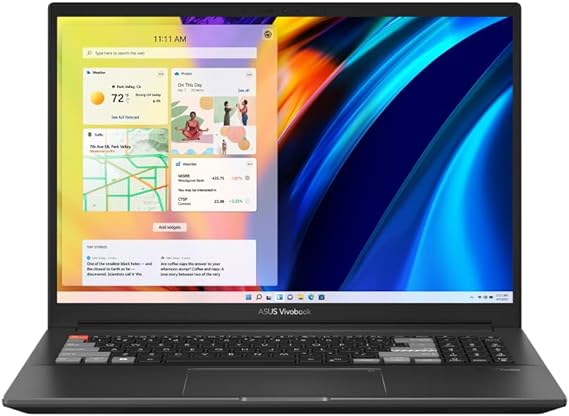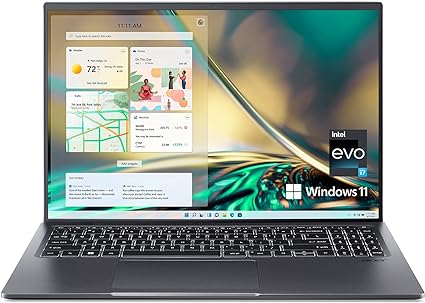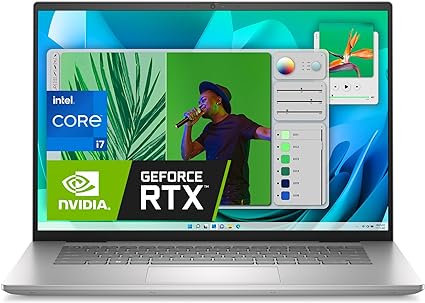
As an engineering student, you’ll need a powerful laptop that can handle demanding coursework, including computer-aided design (CAD) software, complex simulations, and data analysis. However, finding the right laptop can be a challenge, especially if you’re on a budget. Here, we’ll explore the best budget laptops for engineering students, considering factors like processor, RAM, storage, and portability. We’ll also provide recommendations for specific laptops that offer exceptional value for money without compromising on performance.
Engineering laptop requirements
- Processor: Intel Core i5 or AMD Ryzen 5 (8th-gen or newer)
- Memory: 16GB
- Storage: 500GB SSD
- Graphics: Integrated graphics for basic tasks, dedicated graphics for demanding software
- Display: 15.6-inch Full HD (1920×1080) display
The best laptops for engineering students on a budget
- ASUS 2023 Vivobook Pro 16” QHD+ 120Hz IPS Laptop ($1,399)
- Acer Swift X Intel Evo Thin & Light Creator Laptop ($949)
- Dell Inspiron 7630 Laptop ($1,299)
1. ASUS 2023 Vivobook Pro 16” QHD+ 120Hz IPS Laptop

| Model Name | Vivobook Pro 16X |
| Screen Size | 16 Inches |
| Color | Earl Grey |
| Hard Disk Size | 1 TB |
| CPU Model | Core i7 Family |
| Ram Memory Installed Size | 32 GB |
| Operating System | Windows 11 Home |
| Graphics Card Description | Dedicated |
The ASUS Vivobook Pro 16X is a powerful laptop that is a great option for engineering students. It has a powerful Intel Core i7-12650H processor and a NVIDIA GeForce RTX 3050Ti graphics card, which means that it can handle demanding engineering tasks such as CAD and 3D modeling. The laptop also has a large 16-inch QHD+ display with a 120Hz refresh rate, which is great for viewing detailed images and videos.
One of the best things about the ASUS Vivobook Pro 16X is its price. It is a very affordable laptop for its performance, especially when you consider the fact that it comes with a 32GB USB drive for free.
Another great thing about the ASUS Vivobook Pro 16X is its battery life. It can last up to 8 hours on a single charge, which is great for students who are always on the go.
Here are some other things to consider when choosing a laptop for engineering students:
- Processor: The processor is the most important part of any laptop, so it is important to choose one that is powerful enough to handle the demands of engineering software.
- Graphics card: If you plan on using CAD or other 3D modeling software, you will need a laptop with a dedicated graphics card.
- Display: The display should be large enough to see all of your work comfortably, and it should have a high resolution so that you can see details clearly.
- Battery life: Engineering students often use their laptops for long periods of time, so it is important to choose one with a long battery life.
- Portability: If you plan on carrying your laptop to and from class, you will need one that is lightweight and portable.
Overall, the ASUS Vivobook Pro 16X is a great option for engineering students who need a powerful and affordable laptop. It has a powerful processor and graphics card, a large and high-quality display, and a long battery life.
2. Acer Swift X Intel Evo Thin & Light Creator Laptop

| Model Name | SFX16-52G-73U6 |
| Screen Size | 16 |
| Color | Gray |
| Hard Disk Size | 512 GB |
| CPU Model | Core i7 |
| Ram Memory Installed Size | 16 GB |
| Operating System | Windows 11 Home |
| Graphics Card Description | Dedicated |
| CPU Speed | 4.7 GHz |
The Acer Swift X is a powerful and versatile laptop that is well-suited for engineering students on a budget. It has a number of features that make it a great choice for this purpose, including:
- A powerful Intel Core i7-1260P processor with up to 4.7GHz of turbo boost speed. This processor can handle even the most demanding tasks, such as running CAD software or performing simulations.
- A dedicated NVIDIA GeForce RTX 3050 Ti graphics card with 4GB of GDDR6 memory. This graphics card can handle demanding graphics tasks, such as gaming or video editing.
- A large 16-inch WUXGA (1920 x 1200) display with a 16:10 aspect ratio. This display is great for viewing engineering drawings and other complex content.
- 16GB of onboard LPDDR45 memory and 512GB of PCIe Gen 4 SSD storage. This provides plenty of memory and storage for all of your engineering files and applications.
- A long-lasting battery that can last up to 8.5 hours on a single charge. This means that you can take your laptop with you to class or the library without having to worry about it running out of power.
- A number of other features that are important for engineering students, such as a backlit keyboard, a fingerprint reader, and a webcam with AI noise reduction.
Overall, the Acer Swift X is an excellent choice for engineering students on a budget. It is a powerful and versatile laptop that has all of the features that you need to succeed in your studies. It is also available at a reasonable price, making it a great value for the money.
3. Dell Inspiron 7630 Laptop

| Model Name | Dell Inspiron 16 7630 Laptop |
| Screen Size | 16 Inches |
| Color | Silver |
| Hard Disk Size | 512 GB |
| CPU Model | Core i7 Family |
| Ram Memory Installed Size | 16 GB |
| Operating System | Windows 11 Pro |
| Special Feature | Anti-glare |
| Graphics Card Description | Dedicated |
The Dell Inspiron 16 is a powerful and versatile laptop that would be a great choice for engineering students on a budget. With its 13th Gen Intel Core i7 processor, NVIDIA GeForce RTX 3050 graphics card, and 16GB of RAM, it can handle even the most demanding engineering tasks. The 16-inch display is also great for multitasking and viewing large CAD drawings and simulations. Additionally, the laptop’s sustainable packaging and premium services are a bonus.
Here are some of the specific features that make the Dell Inspiron 16 a great choice for engineering students:
- 13th Gen Intel Core i7 processor: This powerful processor can handle even the most demanding engineering tasks, such as running complex simulations and CAD software.
- NVIDIA GeForce RTX 3050 graphics card: This graphics card provides excellent performance for graphics-intensive applications, such as CAD software and video editing.
- 16GB of RAM: This amount of RAM allows you to run multiple applications simultaneously without experiencing slowdown.
- 16-inch display: The large display is great for viewing large CAD drawings and simulations.
- Sustainable packaging: The laptop is shipped in packaging made from 100% recycled and renewable materials, which helps to reduce environmental impact.
- Premium services: The laptop comes with premium support services, such as SupportAssist and Dell Migrate, which can help you keep your laptop running smoothly and transfer data from your old PC to your new one.
Overall, the Dell Inspiron 16 is a great choice for engineering students on a budget. It offers powerful performance, a large display, and sustainable packaging, making it a great value for the price.
Conclusion
In conclusion, engineering students on a tight budget need not fret about finding a capable laptop to handle their demanding coursework. Several excellent options are available at affordable prices, each offering a balance of performance, features, and portability. Whether you prioritize raw processing power, long battery life, or a sleek and lightweight design, there’s a budget-friendly laptop out there tailored to your specific needs.
FAQs
Navigating the vast world of laptops can be a daunting task, especially when you’re on a budget. Finding the right balance of performance, portability, and affordability is crucial for engineering students who need a reliable machine to handle demanding tasks like computer-aided design (CAD) and complex simulations. This guide will delve into the frequently asked questions (FAQs) surrounding the best laptops for engineering students on a budget, providing comprehensive answers and recommendations to help you make an informed decision.
1. What laptop is best for an engineering student?
The best laptop for an engineering student will depend on their specific needs and budget. However, there are a few general factors that are important to consider when choosing a laptop for engineering students.
Processor: Engineering students will need a laptop with a powerful processor that can handle demanding tasks such as running CAD software and performing complex simulations. A good choice for engineering students is a laptop with a recent Intel Core i7 or AMD Ryzen 7 processor.
RAM: Engineering students will also need a laptop with plenty of RAM. 16GB of RAM is a good starting point, but 32GB or more is recommended for students who will be using demanding software.
Storage: Engineering students will need a laptop with a large SSD for storing their files and software. A 512GB SSD is a good starting point, but 1TB or more is recommended for students who will be storing a lot of large files.
Graphics: Engineering students who will be using CAD software or other graphics-intensive applications will need a laptop with a dedicated graphics card. An NVIDIA GeForce RTX 3050 or AMD Radeon RX 6600XT is a good choice for students who need a powerful GPU.
Display: Engineering students will need a laptop with a high-quality display that can accurately reproduce colors and images. A 14-inch or 15-inch display with a resolution of 1920×1080 or higher is recommended.
Battery life: Engineering students will often be using their laptops away from an outlet, so it is important to choose a laptop with good battery life. A laptop with 8 hours of battery life is a good starting point, but 10 hours or more is recommended.
Portability: Engineering students will often be carrying their laptops to and from class, so it is important to choose a laptop that is lightweight and portable. A laptop that weighs less than 5 pounds is recommended.
Operating system: Engineering students can choose between a Windows, macOS, or Linux operating system. Windows is the most popular operating system for engineering students, but macOS and Linux are also viable options.
2. Do engineering students need a powerful laptop?
Yes, engineering students generally need a powerful laptop to handle the demanding software they use for their studies and coursework. The specific requirements will vary depending on the engineering discipline, but in general, a laptop with at least the following specifications is recommended:
- Processor: Intel Core i5 or higher, or AMD Ryzen 5 or higher
- RAM: 16GB or more
- Storage: 512GB or more SSD (Solid State Drive)
Additionally, a dedicated graphics card (GPU) may be beneficial for engineering students who need to use specialized software for 3D modeling, rendering, or simulations.
Here is a breakdown of the software that engineering students commonly use and the recommended hardware specifications:
- AutoCAD: Intel Core i5 or higher, 8GB RAM, 1TB HDD or 256GB SSD
- MATLAB: Intel Core i5 or higher, 8GB RAM, 512GB SSD
- SolidWorks: Intel Core i5 or higher, 16GB RAM, 1TB SSD
- Ansys Fluent: Intel Core i7 or higher, 32GB RAM, 1TB SSD
- Siemens NX: Intel Core i7 or higher, 16GB RAM, 1TB SSD
As you can see, the recommended hardware requirements for engineering software can be quite high. However, it is important to have a powerful laptop that can handle the demanding tasks you will be facing throughout your studies. A slow or sluggish laptop will only hinder your ability to learn and complete your assignments.
Here are some additional tips for choosing a laptop for engineering students:
- Consider portability: Engineering students are often on the go, so you will want a laptop that is lightweight and portable.
- Battery life: Engineering students often use their laptops for long periods of time, so you will want a laptop with good battery life.
- Display quality: A good display is important for viewing engineering diagrams and visualizations.
- Additional features: Consider additional features such as a backlit keyboard and a fingerprint reader.
With careful consideration, you can choose a laptop that will meet your needs as an engineering student and help you succeed in your studies.
3. How much RAM do you need for an engineering laptop?
The amount of RAM you need for an engineering laptop depends on the specific programs you will be using and the complexity of your projects. However, as a general rule of thumb, you should aim for at least 8GB of RAM. This will be sufficient for basic tasks such as web browsing, writing documents, and using spreadsheets. However, if you will be using more demanding software such as CAD programs, finite element analysis (FEA) software, or simulation software, you will need more RAM. For these types of workloads, I recommend 16GB or 32GB of RAM.
Here is a breakdown of RAM recommendations for different engineering disciplines:
- Mechanical engineering: 16GB or 32GB for CAD, FEA, and simulation software
- Civil engineering: 16GB for CAD and FEA software
- Electrical engineering: 16GB for circuit simulation and PCB design software
- Chemical engineering: 16GB for chemical process simulation software
- Software engineering: 8GB for basic programming and web development
- Computer engineering: 16GB or 32GB for complex programming and hardware design
In addition to RAM, you should also consider the processor, graphics card, and storage when choosing an engineering laptop. For the processor, you will need something with at least four cores and a clock speed of 2.5GHz or higher. For the graphics card, a dedicated GPU is recommended for CAD and engineering software. For storage, you will need a solid-state drive (SSD) for faster boot times and program loading.